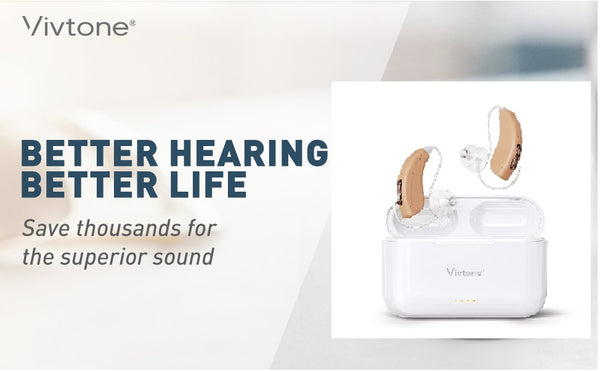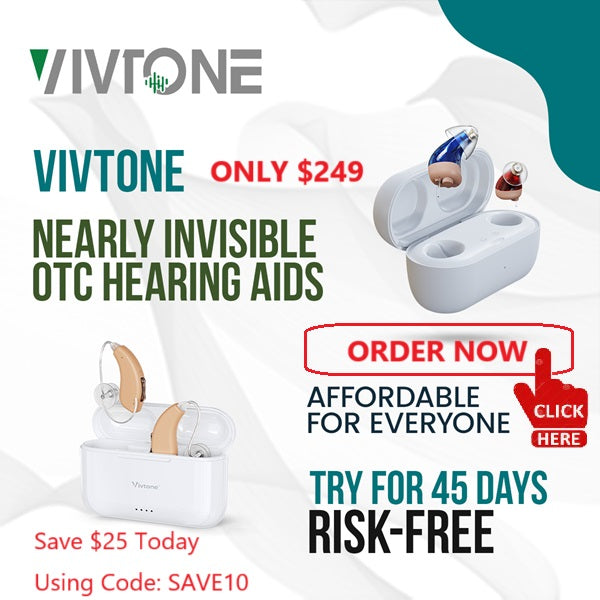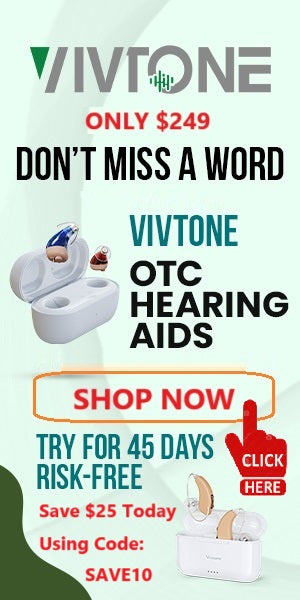OTC Hearing Aids: Affordable Solutions for Mild to Moderate Hearing Loss
Navigation
- Are OTC Hearing Aids FDA Approved?
- What Are The Benefits of OTC Hearing Aids?
- What Factors Should You Consider When Selecting OTC Hearing Aids?
- Who Will Benefit from Over-the-Counter Hearing Aids?

Introduction
Do you ever struggle to hear people clearly during conversations? Do you constantly fiddle with the TV volume or ask others to repeat themselves? You're not alone. Over 37 million adults in the United States deal with some degree of hearing loss. But accessing hearing aids hasn't always been easy or affordable. Traditionally, getting hearing aids meant scheduling tests and appointments with hearing specialists, being custom-fitted for expensive devices, and shelling out thousands of dollars that insurance doesn't cover.
Fortunately, those days are changing thanks to innovative new FDA regulations. The emergence of over-the-counter (OTC) hearing aids provides new options for those with mild to moderate hearing impairment to improve communication and engagement. Read on to learn how OTC hearing aids can improve communication, connection, and quality of life if you experience hearing difficulties. Help is on the way!
Are OTC Hearing Aids FDA Approved?

As ruled by the FDA in 2022, consumers 18 and older with mild to moderate hearing impairment can now buy hearing aids over-the-counter without any mandated medical or audiology exam.
This major regulatory shift stems from 2017 legislation directing the FDA to create an OTC hearing aid category with the goals of increasing accessibility and affordability. Previously classified as prescription medical devices, hearing aids required professional fittings and approvals. But after the FDA's August 2022 final ruling, the path is paved for OTC hearing aid models to hit the consumer market soon.
This long-anticipated move recognizes the demands of an aging population and aims to make hearing assistance technology available to millions more. While not ubiquitous yet, the first FDA-approved OTC products are just starting to become available following the recent guideline changes. Overall, this overhaul represents an important milestone in opening up regulated hearing solutions.
What Are The Benefits of OTC Hearing Aids?

OTC hearing aids provide a range of advantages to users compared to traditional hearing aid models:
- Increased Accessibility: By allowing direct purchase without a prescription, OTC hearing aids greatly improve the accessibility and convenience of obtaining hearing assistance. No longer are doctor visits and fittings required. This removes significant barriers to access.
- Lower Cost: Eliminating bundled professional service fees dramatically reduces the cost of OTC hearing aids versus traditional hearing aids. OTC hearing aids typically cost between $100 and $700, allowing consumers to access quality and reliable models at a much lower price point than professionally-fitted hearing aids, which range from $1000 to $6000 with an average cost of $2500 in the US.
- Customization: Users can easily customize OTC hearing aid settings themselves using a smartphone app. No appointments are necessary for adjustments. This enables responsiveness and personalization.
- Improved Wearability: Discreet, lightweight OTC hearing aid designs improve comfort and wearability over older custom hearing aid models. This facilitates consistent use.
- Effective for Mild to Moderate Hearing Loss: For many with early-stage to mid-level hearing challenges, OTC hearing aids can provide sufficient amplification and sound clarity at an accessible price point.
- Prevents Isolation: By removing barriers to hearing aid access, OTC models can help prevent the social isolation that untreated hearing loss often causes. Users stay engaged.
- Supports Cognitive Health: Increased OTC affordability enables more proactive intervention. Early and consistent hearing aid use safeguards cognitive stimulation.
- Facilitates Activity: Convenience factors of OTC models promote hearing aid use in daily life. Broader access to hearing technology boosts involvement in a range of activities.
- Improves Well-Being: Enhanced hearing ability lifts frustration and embarrassment. OTC hearing aids support confidence, relationships, professional success, and overall well-being.
In summary, the streamlined access, reasonable pricing, and customized convenience conferred by the OTC hearing aid model provide significant advantages and benefits for those with mild to moderate hearing challenges.
What Factors Should You Consider When Selecting OTC Hearing Aids?

When evaluating and selecting OTC hearing aids, consumers should consider these key factors:
- Carefully read packaging and manuals to look for an IP68 waterproof rating, noise reduction capabilities, feedback cancellation, and other features that suit your needs and environment.
- Confirm the device is certified by the FDA as meeting regulatory standards for OTC hearing aids. This validates safety and effectiveness.
- Research the reputation of the brand and manufacturer. Look for companies like Vivtone that are known for quality OTC hearing technology and high customer satisfaction, with prices starting as low as $159.
- Prioritize options with Bluetooth connectivity, rechargeable batteries, and mobile apps for easy adjustment and ambient listening modes. These provide added convenience.
- Opt for models offering free trials or return periods in case the hearing aid needs to be exchanged or refunded after testing it.
- Consult consumer reviews to learn about real-world pros and cons from other users' experiences. This can reveal limitations not shown in promotional materials.
Thorough research and realistic expectations are important when selecting OTC hearing aids. Focusing on critical performance factors, verifiable certifications, and tried-and-true brands will help consumers find quality OTC models to suit their needs and budget.
Who Will Benefit from Over-the-Counter Hearing Aids?

OTC hearing aids are made for specific groups of people:
- Adults with Mild to Moderate Hearing Loss: Those experiencing early to middle-stage hearing difficulties can use OTC hearing aids to amplify sounds and improve clarity in conversation. OTC models provide an affordable and accessible option.
- People Noticing New Signs of Hearing Loss: Individuals who newly observe indicators like misunderstanding speech or turning up the TV can use OTC hearing aids for early intervention before hearing loss progresses further.
- Cost-Conscious Traditional Hearing Aid Users: People who already use prescribed hearing aids may choose OTC models as a supplemental option when the cost is a concern. OTC hearing aids work for less critical listening needs.
- Active Older Adults: As seniors experience typical age-related hearing decline, OTC hearing aids allow them to amplify sounds conveniently and affordably, staying socially and mentally engaged in their vibrant lifestyles.
- Busy Professionals: Professionals with mild work-induced hearing impairment can use OTC hearing aids to quickly and discreetly optimize hearing ability without taking time off for appointments.
- People in Rural Areas: For those in remote areas far from audiology clinics, OTC hearing aids offer easy access online or in general retail stores, avoiding long-distance travel for fittings.
In conclusion, adults perceiving mild to moderate hearing challenges can try OTC models as an accessible option. However, severe hearing loss requires specialist support. Audiologists can help assess appropriate solutions for each individual's hearing loss progression and lifestyle needs.
Before choosing an over-the-counter hearing aid, consider taking Vivtone's free online hearing test. This professional assessment can help determine if such a device fits your needs.
Conclusion
Thanks to long-awaited regulatory changes, OTC hearing aids are poised to become widely available, providing affordable and accessible options for adults starting to experience mild to moderate hearing loss. If you have mild to moderate hearing loss, it's worth checking out the cool options from Vivtone. Their FDA-approved models bring professional-grade features without the crazy high price tag. Bottom line, if you think OTC hearing aids could help you hear better, Vivtone makes it super easy to find the right fit and try it out in a low-risk way.





